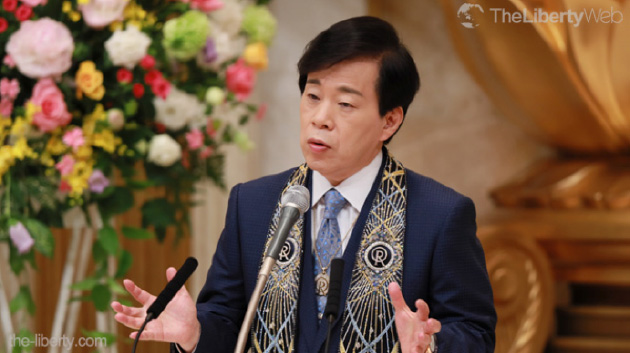Master Okawa’s Japan Constitution Memorial Day Lecture
Three National Pillars For The Future
Key points in this article:
- Seeing Japan’s constitution from a historical perspective: Japan was a developed democratic country before WWII
- How to avoid being fooled by Kim Jong-un: what can a leader sacrifice for their country?
- Trump is thinking about holding talks with North Korea at Panmunjom
Japan’s constitutional debate is in a shambles.The North Korea problem and China’s expansionist ambitions are destabilizing Asia by the day, and Japan’s Abe government – now trying to achieve constitutional amendment – is rife with scandals.
The 3rd of March was Japan’s Constitution Memorial Day. Master Ryuho Okawa, founder and CEO of Happy Science, used this occasion to give a lecture titled “Fulfilling Our Noble Obligation” at Happy Science Tokyo Shoshinkan. This article will go over some of the important points covered in the lecture.
Japan Was A Developed Democratic Country Before WWII
First Master Okawa discussed amending Japan’s constitution.
Japan’s current constitution states that Japan has renounced all of its war rights. The Supreme Commander for the Allied Powers introduced this in the aftermath of WWII to ‘remove Japan’s fangs’. The justification for doing this was the idea that pre-war Japan was a savage totalitarian country.
Master Okawa, however, explained that Japan has upheld the value of equality amongst its people ever since the Meiji Restoration in 1868. In the U.S., on the other hand, intense racism against blacks continued until John F. Kennedy became president in 1961. Seen this way, it is clear that Japan was ahead of the U.S. in terms of spreading democratic values. “The Japanese people should take pride in their good parts, and be confident in these things,” said Master Okawa.
Healthy patriotism will release the country from its self-harming view of history and the current constitutional curse. It will help people view the country with impartial eyes.
How To Avoid Being Fooled By Kim Jong-Un
On the other side of the Sea of Japan is a country that is trying to protect its dictatorial regime.
North Korean leader Kim Jong-un is trying to avert the U.S. maximum pressure campaign by holding talks with South Korea and creating a makeshift ‘peace and friendship’ atmosphere. Top U.K. bookmaker Coral even has Kim as a favorite to win the Nobel Peace Prize this year.
If Kim continues his facade of seeking peace on the Korean Peninsula, it will eventually lead to the continuation of his dictatorial military state regime with all of its nuclear missiles.
In his lecture, Master Okawa contrasted this with Japan’s Showa Emperor who said to Douglas Macarthur, “I don’t care if I get executed; just promise me you will help my people”.
“We need sharp eyes to see what kind of person a leader really is,” Master Okawa said. “We must determine if a leader is prepared to sacrifice himself for the sake of the people”.
In other words, we cannot trust a leader who does not ardently desire the happiness of their people.
We cannot let North Korea simply vow to ‘work towards denuclearization’, Master Okawa warned. We must not stop there and must go all the way by making them remove all weapons, including missiles and chemical weapons.
Holding U.S.-North Korea Talks At Panmunjom
Master Okawa also mentioned that Trump is considering holding the talks with North Korea in Panmunjom (a village near the border between the two Koreas), instead of a third-party country like Singapore.
The purpose of doing this would be to signify that democratic South Korea stands alongside the U.S. It is also a protection against the worst-case emergency that may arise if the talks turn out to be a disaster. His presence would be an encouragement to the U.S. troops stationed in South Korea and the Seventh Fleet could be in a position to protect Trump.
Aside from the North Korea problem, Master Okawa also spoke about the need to deal with the human rights violations involved in China’s invasion of South Mongolia, Uyghur and Tibet.
Freedom, Democracy and Faith
To round off the lecture Master Okawa said that, “Our aim for the future should be for freedom, democracy and faith to unite with politics.”
With freedom and democracy, dictatorships will collapse without the need for weapons to be used. Faith will open our minds to the actuality of a greater criterion for justice than man-made laws and governments. This is the only way to bring an end to corrupt politicians who resort to violence and the suppression of human rights.
Our battle against dictatorships and human rights suppression is, in the end, a battle of ideologies.
Master Okawa’s lecture also touched upon the following additional topics:
- The inconsistencies and dangers of Japan’s new ‘workers reforms’
- The problems with Yutori education in Japan
- The ‘man the machine’ ideology at the root of modern education
- The meaning of work in light of AI developments and workers reform
- Differences in the approach to work between the U.S. and Japan
- How to find happiness in work
- The desire for the intellectual growth required to have a long career
- Inspiration in literature and film
- Proposals for reforms in the Islamic world



















